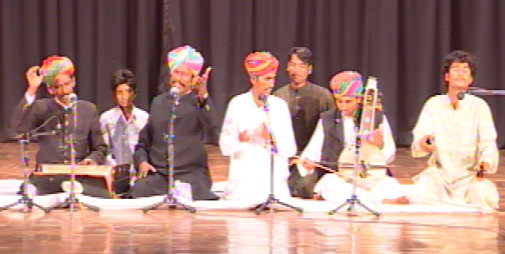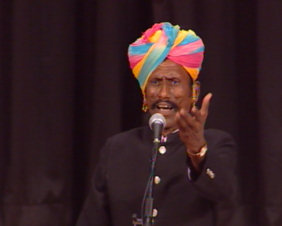The Yaksha Prashna (Answer, Sibyl)

The Yaksha Prashna (Answer, Sibyl) |
 |
Ghanonmatta |
All musicians at times face that dark conflict:can the enthusiasts actually hear the music they create? Worse still, are they really able to produce the sound that being within their head, they hear? The doubt raises its head every now and then as a musician tries to master and occasionally enslave the notes. Sacred indeed is the relationship when the player and the played blend to co-exist as one melody. Dr. Lalmani Misra once confided in a personal letter that now (in his fifties) could he see the notes as something material and concrete; conscious playful entities willing to waft to his wishes. But this divine state does not last forever. Gradually, as his soul unites with his music, the increasing distance between his frail attempts and the ideal symphony wearies the artiste. Such a tragedy -- all his life he runs after a flimsy chimera of perfecting his art, is often forced into believing it himself by doting public, that he has actually done so, only to realize that he was there at last but alas how ephemerally.
 In a recent concert Roze Khan announced
that
their final presentation now is going to be the famous devotional,
"Damadum Mast Kalandar".
The musicians waited prepared for the senior
most member of their Manganiyar troupe, Bade Gazi Khan to
start
the melody. After the leader had completed his long, impressive,
circuitous alap, the musicians were as astounded as the audience that
the maestro had started singing "Padharo
Mero Balama", a number they
had already presented. Gazi Khan moments later sensed the
unease
of his fellows, but he could not understand why. Roze Khan stared
hopefully at him, but Gazi could not understand why. And then it dawned
on him! They were to sing Damadum.
Well, a master can err as anyone, so
what! Not once did his voice waver or a note slip all this while. Now
that he realized that another song was to be presented, it was a matter
of seconds. He was the maestro after all. Was he not the wizard of
notes, their charmer, seducer, their keenest worshiper. Once again the
audience would be amazed as would the troupe feel ashamed, when with a
quick move he would steer the notes of this into those of Damadum. He
just need to take a breath and seize the right moment. Confidence and
the looming challenge gave a different sheen to perspiration on his
face. He had formulated the point of entry. With love for a melody soon
going to be shunned for another, he lunged into hearty vocalization
of Padharo Mero.
Gazi Khan had allowed the younger singers to round
off the stanza. He filled his lungs and set his mood to start off
another miraculous, mesmerizing alap that would lead to the desired
song. After all was he not the poet who could write songs like Nimbuda which
three decades later appealed to philmi log who stole the melody without
acknowledging him. But does not the world know? He had sung it in the
best of places.
In a recent concert Roze Khan announced
that
their final presentation now is going to be the famous devotional,
"Damadum Mast Kalandar".
The musicians waited prepared for the senior
most member of their Manganiyar troupe, Bade Gazi Khan to
start
the melody. After the leader had completed his long, impressive,
circuitous alap, the musicians were as astounded as the audience that
the maestro had started singing "Padharo
Mero Balama", a number they
had already presented. Gazi Khan moments later sensed the
unease
of his fellows, but he could not understand why. Roze Khan stared
hopefully at him, but Gazi could not understand why. And then it dawned
on him! They were to sing Damadum.
Well, a master can err as anyone, so
what! Not once did his voice waver or a note slip all this while. Now
that he realized that another song was to be presented, it was a matter
of seconds. He was the maestro after all. Was he not the wizard of
notes, their charmer, seducer, their keenest worshiper. Once again the
audience would be amazed as would the troupe feel ashamed, when with a
quick move he would steer the notes of this into those of Damadum. He
just need to take a breath and seize the right moment. Confidence and
the looming challenge gave a different sheen to perspiration on his
face. He had formulated the point of entry. With love for a melody soon
going to be shunned for another, he lunged into hearty vocalization
of Padharo Mero.
Gazi Khan had allowed the younger singers to round
off the stanza. He filled his lungs and set his mood to start off
another miraculous, mesmerizing alap that would lead to the desired
song. After all was he not the poet who could write songs like Nimbuda which
three decades later appealed to philmi log who stole the melody without
acknowledging him. But does not the world know? He had sung it in the
best of places.
The musicians, at ease with the melody now, were playing their instruments with zeal. Jassu Khan had seized upon another interlude to bewilder the audience with his clicking Khad-tal. Young Debu too had a chance to play on his Morchhang. Roze Khan was delighted with the performance of his youngest son. He felt sure that one day Debu would lead a Manganiyar troupe of his own. Thanks to Komal Kothari ji,1 they had been taught how to form small groups, approach organizers and earn a livelihood by lending their skills to occasional TV and film recordings along with stage recitals. The name of their troupe was included in almost all government cultural agencies and they bagged sufficient invites during the season to feel satisfied with their vocation. Roze Khan being a forward looking man had also started a folk academy where his sons, nephews and other troupe members taught younger manganiyars and some occasional city-bred enthusiast. Bade Gazi Khan had given him a break and now he had established himself. In public he still exalted the senior singer. He hoped his sons too might one day like their uncle, become international stars. He enjoyed the surprise change to awe and then envy on the faces of confident sahibs when Gazi started naming the countries he had visited. While traveling, they would often make Gazi Khan name the countries and by the time he had named only thrity or so of the fifty four he had visited, they would all be doubled up with laughter. It would take Roze some effort to discipline his troupe. Except for Debu, almost all of them had visited a couple of countries or more.
 The captivating beat on dholak had like
a large
cloak enveloped all in the auditorium. Khad-tal and morchhang were less
prominent, but Kamayncha could hold its own against the drum. It was
following just the notes that would give Gazi an opportunity to take
his flight. He felt like a olympian who was certain of his
hop-step-and-jump record. He started right on the note he had
planned. It was a deep note of the mandra saptak which required some
time to establish. The eight beats of Kaharva gave him the freedom to
launch off whenever he flet like. Gazi gradually moved from lowermost
note of mandra that he could muster. It was gandhar when he began to
hear it himself. By the time he reached dhaivat, the note would be
audible to all, but with so many accompanists playing along, madhya
shadaj would really dominate and govern the mood. Come shadaj and he
would change the tracks so brilliantly that even Roze would realize
that Gazi would never be surpassed as the maestro Manganiyar.
The captivating beat on dholak had like
a large
cloak enveloped all in the auditorium. Khad-tal and morchhang were less
prominent, but Kamayncha could hold its own against the drum. It was
following just the notes that would give Gazi an opportunity to take
his flight. He felt like a olympian who was certain of his
hop-step-and-jump record. He started right on the note he had
planned. It was a deep note of the mandra saptak which required some
time to establish. The eight beats of Kaharva gave him the freedom to
launch off whenever he flet like. Gazi gradually moved from lowermost
note of mandra that he could muster. It was gandhar when he began to
hear it himself. By the time he reached dhaivat, the note would be
audible to all, but with so many accompanists playing along, madhya
shadaj would really dominate and govern the mood. Come shadaj and he
would change the tracks so brilliantly that even Roze would realize
that Gazi would never be surpassed as the maestro Manganiyar.
One could not become a showman by talent alone; several people have that. It takes a different sensibility to click with the audience. It was not the power alone in his singing but the sternness of his face that made Pandit Bhimsen Joshi the reigning emperor of notes. Gazi Khan shifted the load on his aching knees and flipped the switch which would launch the melody on a different track. Almost as if charmed by his railway analogy, the young singers chose just that moment to give full blast to the high pitched notes of Padharo like the ancient steam engine drowning all order with its chaotic whistle. His attempt to launch into Damadum Mast Kalandar had been aborted by his nephews, who were singing just the way the they were trained to by Gazi.

References :
Although the concert referred to did take place on August 20th 2006 at the central auditorium of Devi Ahilya University Indore, it is not a factual report of the event.
1 Komal Kothari has been observing, recording and documenting the folk cultures of Rajasthan for over 50 years and has a unique perspective on the subject of his study.